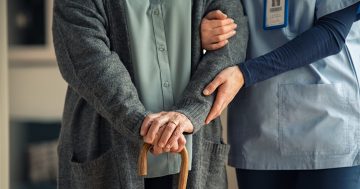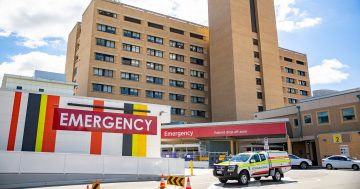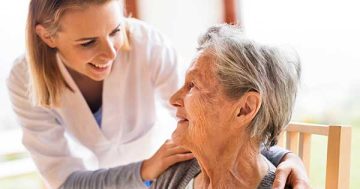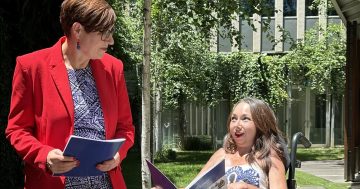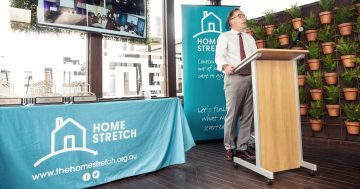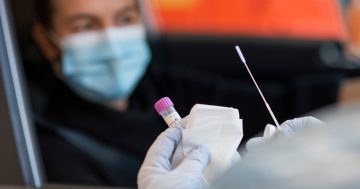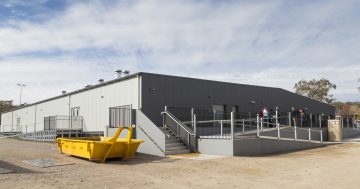
A couple at Goodwin Village Ainslie is quarantining at home with COVID-19. Photo: Goodwin Aged Care Services.
UPDATED 1 pm: A second COVID-19 case has been confirmed at an Ainslie aged care facility and a school in Tuggeranong is closed today for deep cleaning after confirmation of a case there last Friday.
The aged care facility is Goodwin Village Ainslie, while the school is the Junior Campus of Caroline Chisholm School in Chisholm.
Goodwin Aged Care Services said that a fully vaccinated resident at Goodwin Village Ainslie tested positive yesterday.
It said this second case was linked to the original case that was reported on Friday.
The two were spouses who had been quarantining together in their apartment, Goodwin said.
“They are currently recovering at home and are being supported by ACT Health and the Goodwin team,” Goodwin said.
“Our staff continue to focus their attention on the needs and safety of our residents, which is our utmost priority.”
Goodwin said the retirement living lifestyle centre and common areas had been thoroughly sanitised and the village was following ACT Health advice to minimise the spread of infection.
“All residents have been notified and we will continue to ensure they are kept well informed,” Goodwin said.
Goodwin said residents were following the strict prevention and control protocols it had put in place, including using QR codes when accessing common areas, which will assist contact tracing.
It said there were no cases in any other Goodwin facility or village at this time.
In a letter to parents posted on social media, Caroline Chisholm School principal Jennifer Howard said that a confirmed case attended the school on Friday (15 October) between 8:40 am and 12:30 pm while unknowingly infectious.
She said ACT Health was conducting a risk assessment and contact tracing, but anyone who was at the school during those times should stay home until further advice.
But this did not apply to a parent or carer who dropped off a child and did not enter the premises.
Neither site has been listed as an exposure location on the ACT COVID-19 website.
The only location listed is HealthFount Medical Centre in Macquarie.
It is named a casual contact site on Friday from 9:20 am to 11:15 am, and 3:20 pm to 4:20 pm.
ACT Health has stopped listing all exposure locations to focus on the higher-risk situations.
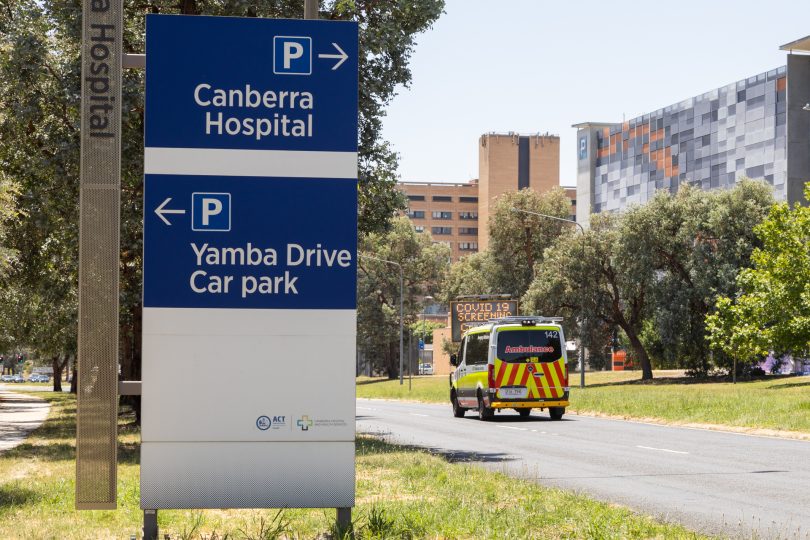
There are currently 20 people in hospital with COVID, including eight in intensive care. Photo: Michelle Kroll.
UPDATED 11:10 am: The ACT has recorded 24 new cases of COVID-19.
Yesterday there were also 24 cases.
Of the new cases, 17 are linked to known cases or ongoing clusters. There are currently 20 people in hospital with COVID, including eight in ICU.
In NSW there were 283 cases and seven deaths.
Yesterday there were 273 new COVID cases and four more deaths.
In Victoria, 1841 new cases and 12 deaths were recorded.
Yesterday the state had 1749 cases and 11 deaths.
Earlier this morning, Federal Health Minister Greg Hunt announced 70 per cent of the eligible population was now fully vaccinated and the first vaccination rate is 85.5 per cent.
“This is a testament to the work of Australians and it is a testament to our health professionals and everybody that has been involved in the vaccination program so to Australians, I want to say thank you and congratulations,” Mr Hunt said.
A total of 277,000 jabs were administered yesterday across Australia.
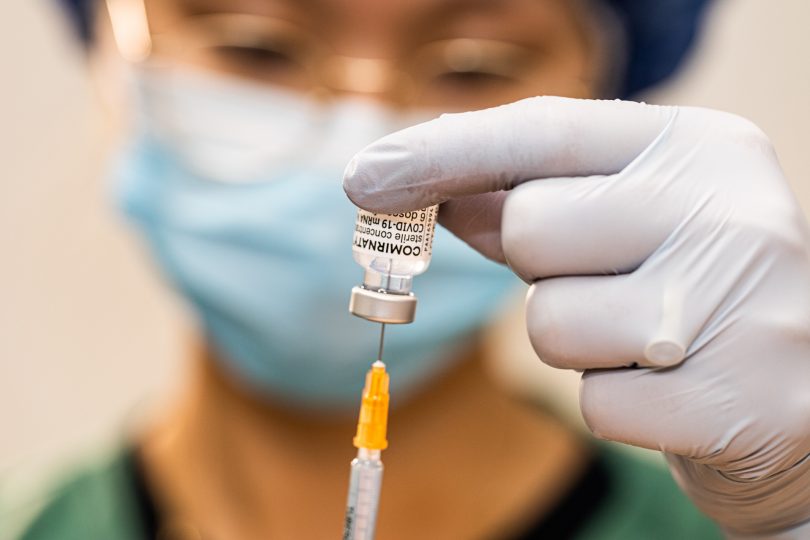
The government says it is important that carers in higher-risk settings have the highest possible level of vaccination. Photo: Michelle Kroll.
10 am: Disability support workers and in-home and community aged care workers in the ACT will soon need to be vaccinated against COVID-19 by 29 November if they want to continue working in these settings.
The ACT Government announced today that the ACT Chief Health Officer would sign a new public health direction that will require these workers to be vaccinated as a condition of work or to provide in-home care or services.
Staff working across these sectors will be required to receive their first vaccine dose by no later than 1 November and be fully vaccinated by 29 November.
ACT Minister for Health Rachel Stephen-Smith said the decision to introduce mandatory vaccinations to these occupations was supported by recommendations from the Australian Health Protection Principal Committee, including the creation of national definitions.
It comes after vaccination was made mandatory for staff in residential aged care facilities, hospitals, schools and early childhood education and care settings.
“Although we have very high vaccination rates in the ACT and have worked hard to ensure people with disability and older people have every opportunity to be vaccinated, it is important that those providing care in higher-risk settings also have the highest possible level of vaccination,” Ms Stephen-Smith said.
“Most eligible Canberrans have eagerly been getting vaccinated, but Commonwealth data indicate that rates are not as high among disability support workers.”
Minister for Disability Emma Davidson said this direction would give greater confidence to people with disability, more certainty for the sector and keep more at-risk Canberrans protected as restrictions ease.
“The disability and aged care sectors provide a lot of essential support for many people and play an important role to support their individual needs to make Canberra a more inclusive place,” she said.
“Some of the people they support have felt uncomfortable asking for a worker who is fully vaccinated, so this measure will provide more confidence in the sector and the organisations they access,” she said.
Consultation with stakeholders, including unions, will continue prior to the Chief Health Officer signing a new public health order.
Under the public health orders:
- People working in the disability sector must be vaccinated to provide services to people with disability if a registered NDIS provider engages them, or state or territory government to assist with daily life tasks and personal activities, group and centre-based activities, or provide disability support to clients who work at a social enterprise business.
- Professionals that provide community nursing care and therapeutic supports must also be vaccinated.
- People working in the in-home and community aged care sector must be vaccinated if they deliver home care services for the aged-care sector or Commonwealth, state or territory government.
This will apply to all workers, whether they are full-time, part-time, casual or volunteers.












